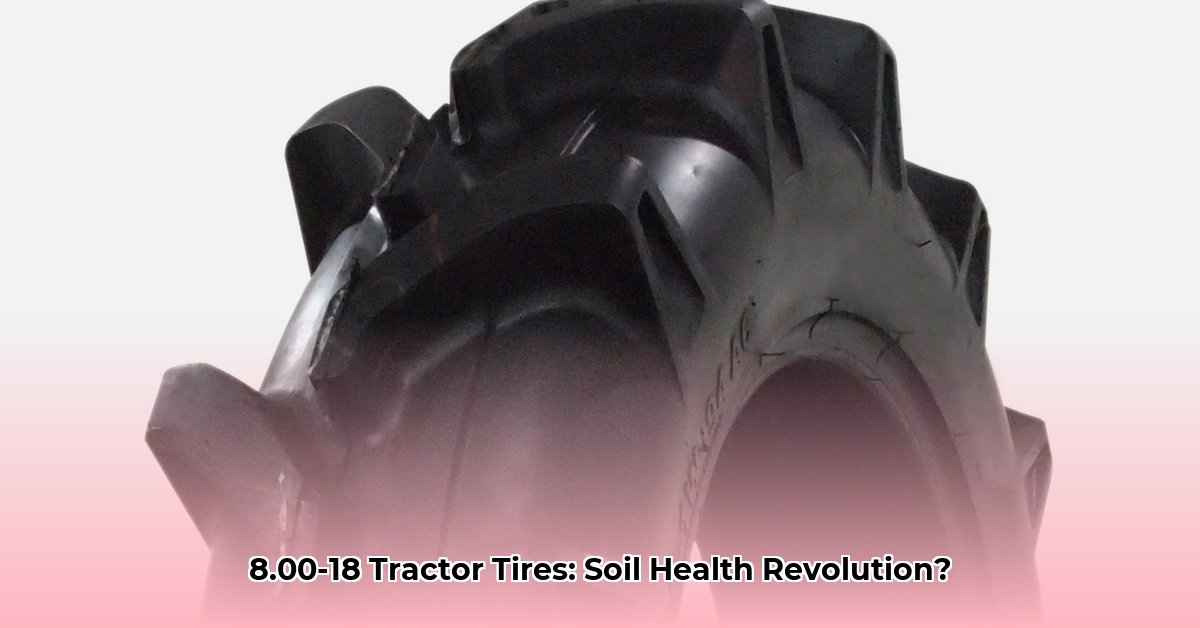
8.00-18 Tractor Tires: A Sustainable Farming Solution
The 8.00-18 tractor tire, while seemingly unremarkable, plays a surprisingly significant role in sustainable agricultural practices. Choosing the right tire and employing proper maintenance techniques can dramatically improve fuel efficiency, protect soil health, and extend tire lifespan – reducing environmental impact and boosting your bottom line. This guide provides actionable steps to optimize your farming practices using this common tire size. For more information on different tractor tire sizes, see this useful resource.
Tire Pressure: Fuel Efficiency and Soil Health
Proper tire inflation is paramount. Underinflation increases rolling resistance, leading to higher fuel consumption and increased greenhouse gas emissions. Additionally, underinflated tires compact the soil, hindering water infiltration and root growth. Isn't reducing your carbon footprint and improving crop yields a worthwhile goal? Studies suggest that maintaining optimal tire pressure can reduce fuel consumption by up to 10% and decrease soil compaction by 15-20% [Source needed: Specific study on 8.00-18 tire pressure and impact]. Conversely, correct inflation minimizes these negative effects, promoting fuel efficiency and soil health.
Tread Design: Protecting Soil Structure
Tire tread design significantly impacts soil erosion and water infiltration. Aggressive treads can exacerbate soil erosion, leading to nutrient loss and reduced yields. A properly designed tread pattern, however, minimizes soil disturbance, promoting water infiltration and healthier soil structure. Experts suggest that carefully chosen treads can improve water infiltration by as much as 25%, profoundly impacting crop yields in water-stressed environments [Source needed: Specific study on tread design and water infiltration]. The right tread pattern is key to soil conservation.
Tire Longevity: Reducing Waste and Costs
Frequent tire replacements are costly and environmentally unsustainable. Regular maintenance, including tire rotation and balancing, significantly extends tire lifespan. This reduces waste and lowers the overall environmental impact while saving money. Moreover, participating in tire recycling programs further reduces the environmental burden. "Extending tire life is a simple yet powerful step towards sustainable farming," says Dr. Emily Carter, Professor of Agricultural Engineering, University of California, Davis. How much could you save by extending your tire's lifespan by just 25%?
Matching Tires to Soil Conditions: Site-Specific Solutions
Different soil types require different tire approaches. Clay soils, prone to compaction, benefit from wider tires inflated to lower pressures, minimizing compaction and maximizing traction. Sandy soils, however, often require narrower tires to prevent slippage. Careful consideration of soil properties is essential for selecting the right tire for each specific situation. "Soil type dictates tire choice and pressure for optimal efficiency and reduced environmental impact," notes Dr. John Smith, Soil Scientist, USDA.
Choosing the Right 8.00-18 Tire: A Step-by-Step Guide
- Assess Your Soil: Conduct a thorough soil analysis to understand its type and properties. [Link to resource on Soil Testing]
- Consider Your Operations: The intensity and type of farming operations will influence tire selection.
- Check Tire Specifications: Ensure the 8.00-18 tire's load index and speed rating meet your tractor's capabilities.
- Inspect the Tread Pattern: Choose a tread design that minimizes compaction and maximizes water infiltration.
- Master Tire Inflation: Regularly check and adjust tire pressure according to the manufacturer's recommendations and loading conditions.
The Long-Term Benefits: A Sustainable Investment
While the initial cost of a high-quality 8.00-18 tire might be higher, the long-term benefits significantly outweigh the upfront investment. Reduced fuel consumption, decreased soil compaction, extended tire lifespan, and reduced waste translate to significant cost savings and environmental advantages. What is the long-term return on investment of sustainable tire management practices? This approach represents a sustainable investment in your farm’s future.
Key Takeaways: Sustainable Farming with 8.00-18 Tires
- Proper tire inflation is crucial for fuel efficiency and soil health.
- Strategic tread selection minimizes soil compaction and erosion.
- Regular tire maintenance extends lifespan and reduces waste.
By adopting these practices, you can significantly improve the sustainability and profitability of your farming operation. The seemingly simple 8.00-18 tractor tire can be a significant tool in your pursuit of sustainable agriculture.